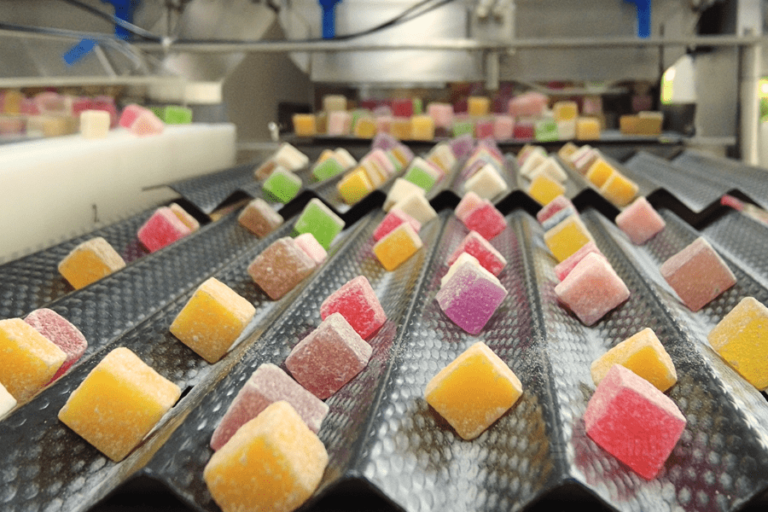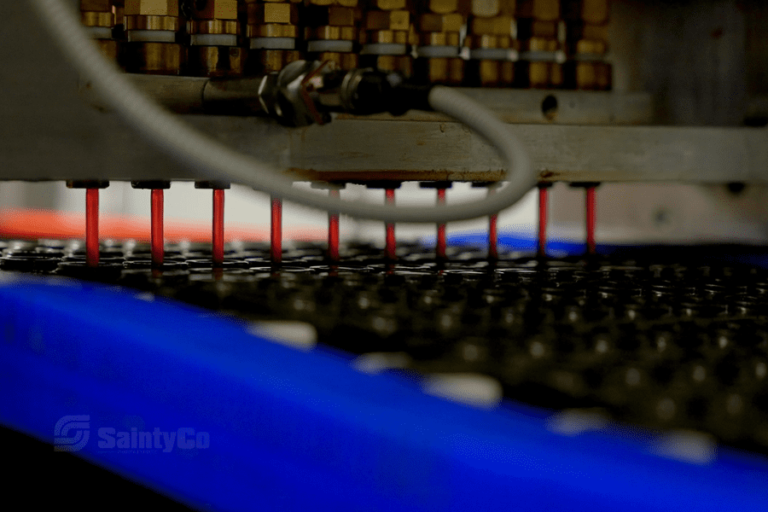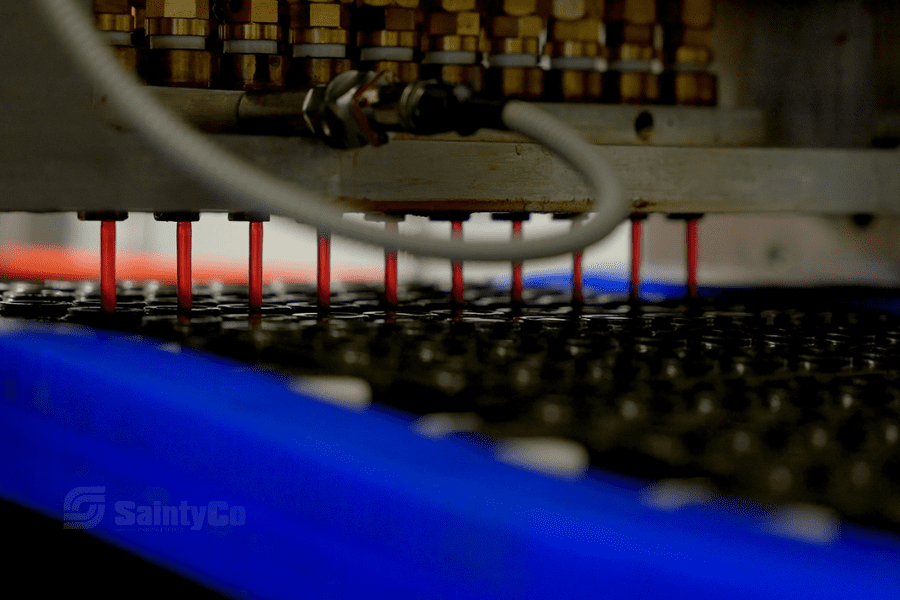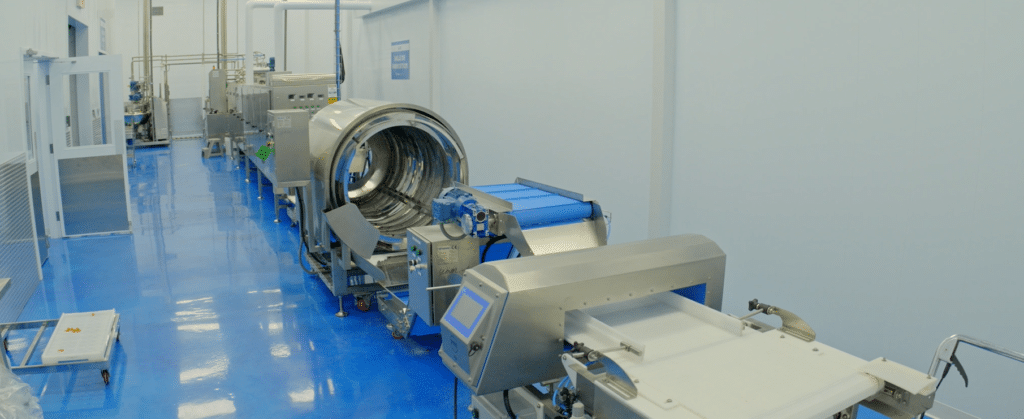Establishing a supplements and OTC gummies factory in Algeria presents an exciting opportunity for entrepreneurs venturing into the growing health and wellness market.
To set up a CBD gummies and supplements factory in Algeria, you need to comply with local regulations, select suitable gummy production equipment, plan an efficient facility layout, develop tailored gummy recipes, and ensure quality assurance through pilot testing.
As you delve deeper, this guide will offer valuable insights into navigating regulatory landscapes, choosing the right machinery for your production scale, and crafting high-quality gummies that meet market demands.
Local regulations in Algeria are strict for supplements factories.True
Algeria has specific regulatory requirements for health-related manufacturing.
Pilot testing is unnecessary for gummy production in Algeria.False
Pilot testing ensures quality and compliance with local standards.
What Are the Regulatory Requirements in Algeria for Gummy Production?
Entering Algeria's gummy market requires understanding its complex regulatory landscape. From local certifications to production standards, navigating these requirements ensures compliance and smooth operations.
To produce gummies in Algeria, comply with local food and pharmaceutical standards, secure necessary certifications like GMP and Halal, and adhere to labeling laws. This ensures legal production and distribution.
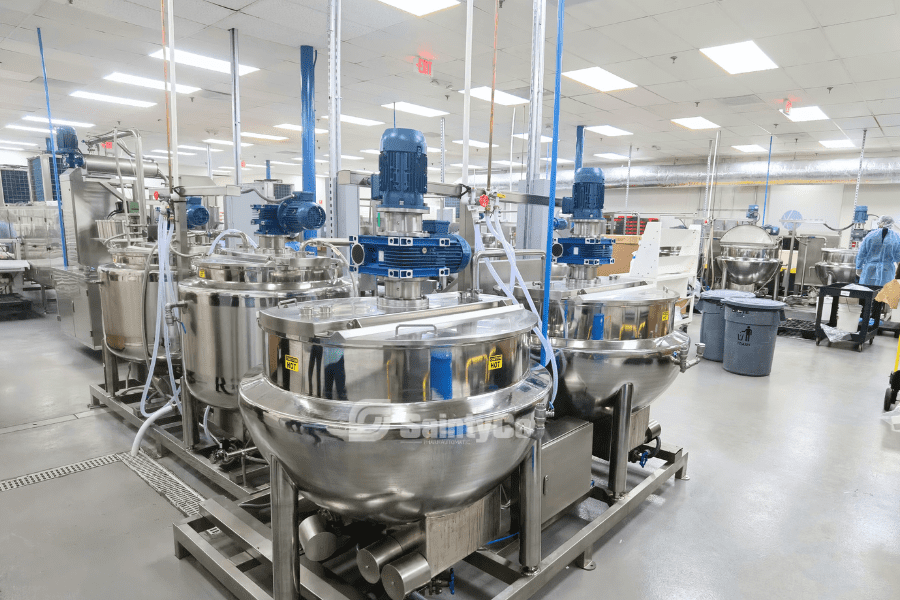
Key Regulatory Bodies
In Algeria, the primary authorities overseeing gummy production are the Ministry of Health and local food safety agencies. These bodies enforce regulations to ensure consumer safety1. Understanding their requirements is crucial for compliance.
Certifications Required
Depending on the type of gummy product, several certifications may be required:
- GMP (Good Manufacturing Practices): Ensures that products are consistently produced and controlled according to quality standards.
- ISO 22000: Aims at food safety management systems, which are critical for food manufacturers.
- Halal Certification: Necessary for meeting dietary standards in the region.
These certifications demonstrate a commitment to quality and safety, paving the way for smoother market entry.
Labeling Requirements
Algeria mandates specific labeling laws, especially for nutraceuticals2 and CBD gummies. Labels must include:
- Product information in Arabic.
- Nutritional details.
- Manufacturer's information.
This compliance not only aligns with legal requirements but also caters to consumer transparency.
| Certification | Description |
|---|---|
| GMP | Quality control standards |
| ISO 22000 | Food safety management |
| Halal | Dietary compliance |
Equipment Standards
Choosing the right equipment is vital for regulatory compliance. Equipment should meet international hygiene standards and be suited for producing various gummy types, including gelatin and pectin-based ones. Consider advanced lines like the SaintyCo G80 or G150 fully automatic starchless gummy production line3 for medium to large-scale production.
Import Regulations
If importing equipment or raw materials, understanding Algeria's import regulations is essential. These include tariffs, duties, and potential restrictions on certain ingredients or machinery. Staying informed about these can prevent costly delays.
Environmental Control Requirements
Maintaining specific environmental conditions such as a temperature of 20-25°C and humidity below 55% is crucial for optimal gummy production. These conditions help ensure product quality and longevity, complying with regulatory standards.
Being well-versed in these regulatory aspects not only facilitates legal operations but also positions your brand as a reliable player in the Algerian market.
GMP certification is mandatory for gummy production in Algeria.True
GMP ensures quality control, crucial for compliance with Algerian regulations.
Algeria requires all gummy labels to be in English only.False
Labels must include product information in Arabic to meet legal requirements.
Which Gummy Production Equipment Is Best Suited for Your Scale of Operation?
Navigating the complex world of production equipment can be challenging. Selecting the right tools for your scale of operation ensures efficiency, cost-effectiveness, and seamless integration into your existing processes.
Choosing the best gummy production equipment depends on the scale of your operation. For start-ups, compact, entry-level gummy depositors are ideal. Medium to large-scale operations benefit from advanced gummy production lines with greater capacity and efficiency.
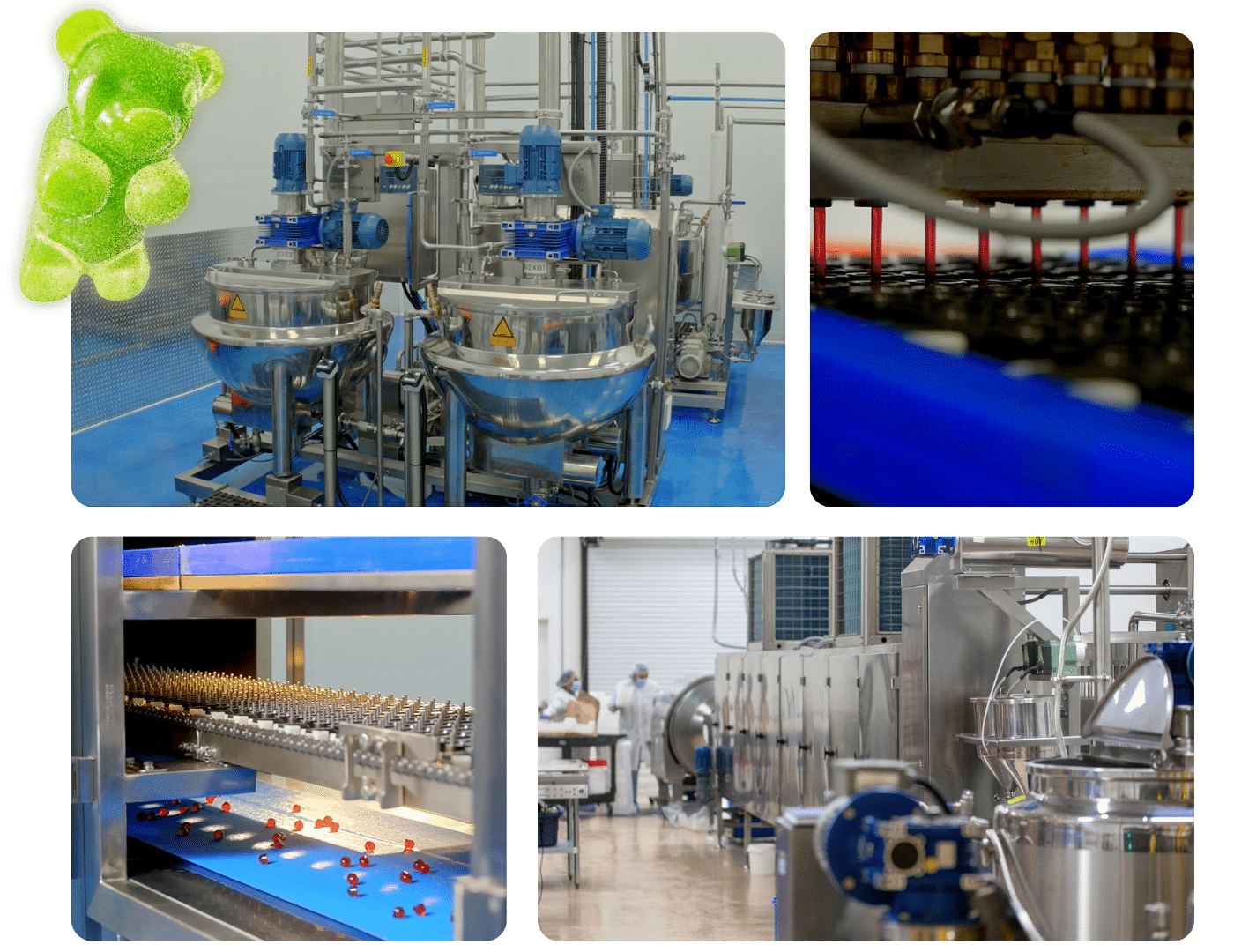
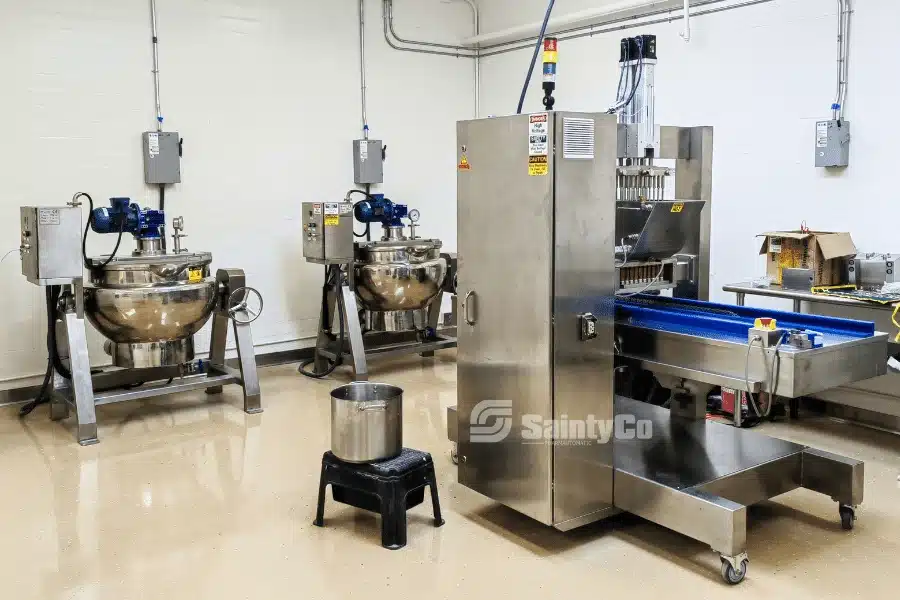
Evaluating Your Operational Scale
Understanding your operational scale is crucial in selecting equipment. Start-ups might require compact, entry-level machines like the DP-10S/DM-20S/DM-50X gummy depositor for initial phases. These are cost-effective and allow experimentation. Medium or large-scale operations necessitate more advanced setups such as the G150 non-starch gummy production line, which offers higher capacity.
Production Line Essentials
Your production line forms the backbone of your operation. For smaller ventures, starchless automatic gummy lines are suitable, offering flexibility with gelatin, pectin, and functional gummies4. Large-scale productions benefit from continuous cooking systems that enhance precision and efficiency.
Auxiliary Equipment: A Key Consideration
Auxiliary equipment enhances production quality. An oil coating drum like the SaintyCo CW-600 can improve gloss and shelf life of gummies. For traditional polishing and sugar coating, a sugar polishing pan5 is invaluable. Compact drying trays optimize space usage in production areas.
Facility Planning and Layout Design
Efficient facility planning is fundamental. An optimized layout with distinct zones for syrup cooking, gummy depositing, and packaging enhances workflow efficiency. Modular spaces are beneficial for accommodating future growth6, ensuring your facility adapts with scaling needs.
| Scale of Operation | Suggested Equipment | Capacity (Gummies/Hour) |
|---|---|---|
| Start-Up | DP-10S/DM-20S/DM-50X Depositor | 5,000 - 18,000 |
| Mid-Scale | SaityCo G40 or 150 Lines | 15,000 - 60,000 |
| Large-Scale | SaityCo G300 or G800X | Up to 240,000 |
Ensuring Quality Through Recipe Development
Developing custom recipes can set your product apart. Pectin-based recipes cater to halal compliance, ensuring broader market appeal. Pilot-scale testing is crucial to maintain consistency in quality and texture before fully scaling up your operations.
Training and Support: Essential Components
Investing in staff training ensures smooth operation of complex machinery. Ongoing technical support provides reassurance, helping address maintenance or upgrade needs quickly and efficiently.
By understanding these aspects of production equipment selection, you can optimize operations to match your scale while maintaining quality and efficiency throughout the process.
Start-ups should use the DM-20S for initial phases.True
The DM-20S is cost-effective and suitable for start-ups.
How Should You Plan Your Gummy Factory Layout for Optimal Efficiency?
Creating an efficient factory layout is essential for maximizing productivity and minimizing costs. Whether you're producing gummies or widgets, a well-planned layout can streamline operations and boost your bottom line.
To plan an optimal factory layout, assess your production needs, prioritize workflow efficiency, and ensure compliance with local regulations. Design separate zones for each production stage and consider future scalability.
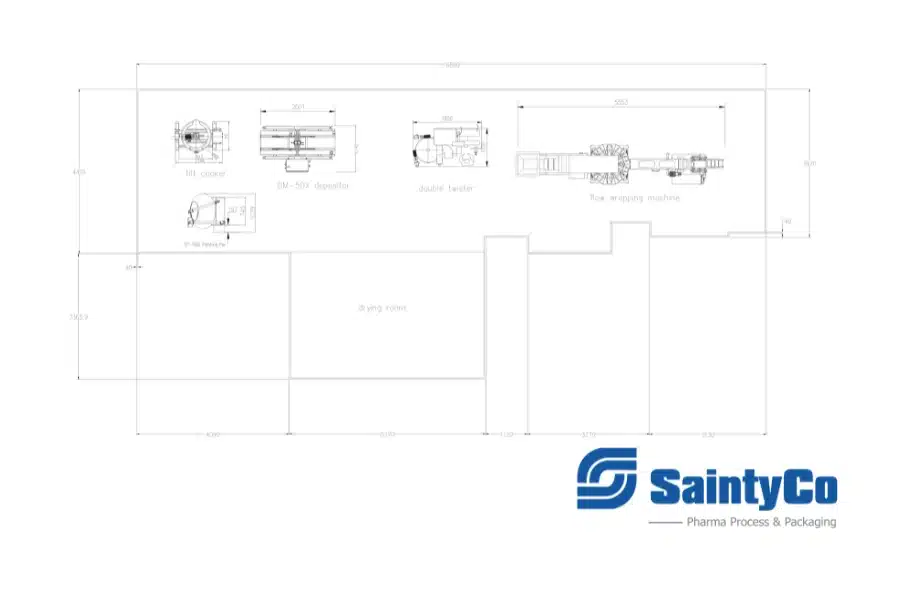
Understanding Your Production Needs
Before diving into the specifics of factory layout, clearly define your production goals. Are you a start-up7 or scaling up operations? Understand the equipment required for your production scale. For instance, compact units like the DM-20S are ideal for start-ups.
Designing for Workflow Efficiency
Separate zones for each production stage enhance workflow efficiency. Imagine a gummy production line: syrup cooking should be separate from gummy depositing and packaging. This separation minimizes cross-contamination and streamlines processes. Consider incorporating modular spaces8 to accommodate future growth without major disruptions.
Compliance and Environmental Control
Adhering to local regulations is crucial. For instance, maintaining specific temperature and humidity levels is vital for optimal gummy production. Ensuring compliance with standards like GMP can prevent costly shutdowns. Design the layout with compliance in mind9.
Equipment Layout and Utility Planning
The equipment layout must consider utilities like electrical, water, and drainage facilities. Ensure these are planned efficiently to avoid bottlenecks. A table below can help visualize utility requirements:
| Equipment | Electrical Needs | Water Needs | Drainage Needs |
|---|---|---|---|
| DM-20S | 220V, 60Hz, 1 phase | Medium | Low |
| G150 | 380V, 50/60Hz, 3 phases | High | High |
DM-20S: Compatible with Algeria's 230V supply and 50Hz frequency; no additional equipment is needed unless voltage fluctuates, in which case a stabilizer is recommended.
G150: Requires three-phase 380V. If only three-phase 230V is available, a step-up transformer is necessary. Supports 50Hz directly. Surge protection or a stabilizer is advised for both machines.
Future-Proofing Your Layout
Think beyond current needs. The layout should allow for easy integration of new technology or expansion of production lines. This forward-thinking approach saves money in the long run and keeps your operation competitive10.
Separate zones reduce cross-contamination.True
Distinct areas for production stages prevent cross-contamination effectively.
Ignoring utility planning doesn't affect efficiency.False
Neglecting utilities can cause bottlenecks, reducing operational efficiency.
What Recipe Development Strategies Ensure Quality and Compliance of Gummy Products?
In the intricate world of gummy manufacturing, crafting formulas that meet quality standards and regulatory compliance is crucial. This ensures consumer safety and product success.
Successful gummy recipe development strategies incorporate market understanding, compliance with local regulations, and proper equipment choice. This ensures high-quality, compliant products in the gummy industry.
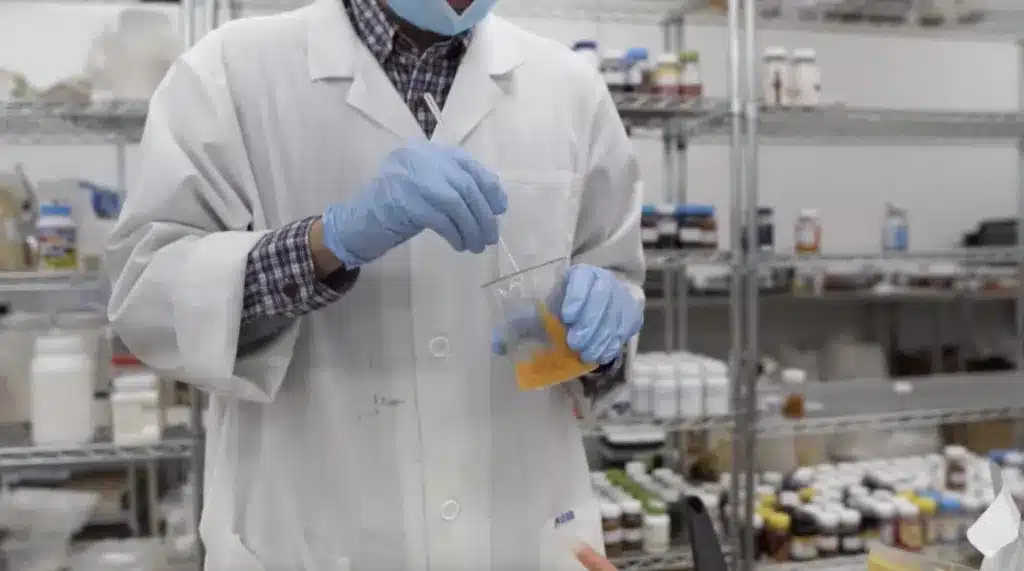
Understanding Market & Regulatory Compliance
A deep understanding of market needs and regulatory frameworks is essential for developing recipes that resonate with consumers and meet legal standards. For instance, in Algeria, gummy producers must comply with local regulations, including certifications like GMP and ISO 22000. Consider pectin-based recipes for halal compliance11 to cater to specific markets.
Defining Business Scale
Scaling operations requires strategic planning. Start-ups might opt for entry-level equipment like the DM-20S, ideal for pilot-scale productions. In contrast, larger operations may benefit from advanced lines such as the SaintyCo G800 Gummy Production Line, capable of producing up to 240,000 gummies per hour. Below is a table showcasing equipment options:
| Scale of Operation | Suggested Equipment | Capacity (Gummies/Hour) |
|---|---|---|
| Start-Up | DP-10S/DM-20S/DM-50X Depositor | 5,000 - 18,000 |
| Mid-Scale | SaityCo G40 or 150 Lines | 15,000 - 60,000 |
| Large-Scale | SaityCo G300 or G800X | Up to 240,000 |
Choosing the Right Equipment
The right equipment ensures consistent product quality and compliance. For instance, a starchless automatic gummy line suits various gummy types, including functional gummies like CBD or vitamin-enriched ones. Continuous cooking systems offer precision and efficiency. Custom features such as flexible molds allow for unique shapes like worms or fruits, enhancing product appeal.
Facility Planning
Efficient facility planning supports optimized production flows. Separate zones for syrup cooking, gummy depositing, and packaging prevent cross-contamination. Modular spaces allow flexibility and scalability. Ensure utilities like electrical and water systems support production demands.
Recipe Development and Quality Assurance
Creating customized recipes aligned with consumer demand and compliance is key. Pilot-scale testing ensures consistency before full-scale production. Consider different base ingredients like gelatin or pectin based on market needs and compliance requirements.
Packaging Solutions
Packaging plays a crucial role in maintaining product quality and compliance. Flexible packaging machines facilitate diverse options such as flow wrapping or bottle filling. Ensuring labeling compliance with local laws, such as Arabic language requirements in Algeria, is vital.
Support and Scalability
Offering training and technical support ensures smooth operations and adaptation to new technologies. Ongoing support is crucial for maintenance and upgrades, ensuring long-term success in recipe development and production processes.
By exploring these strategies, businesses can create recipes that not only meet high-quality standards but also comply with regulatory requirements, thus ensuring success in the competitive food industry marketplace. Implementing these strategies helps maintain consumer trust and satisfaction while adhering to legal standards for food safety and quality control processes like GMP certification12.
Algerian food producers must comply with GMP and ISO 22000.True
GMP and ISO 22000 are essential certifications for compliance in Algeria.
The G300 equipment option is ideal for start-up businesses.False
G300 is suited for large-scale operations, not start-ups.
How Can You Address Gummy Packaging and Labeling Requirements Effectively?
Navigating packaging and labeling requirements can be daunting, but with strategic planning and compliance awareness, businesses can effectively meet regulations while optimizing market appeal.
Addressing packaging and labeling requirements involves understanding regulatory standards, choosing suitable materials, and ensuring clear and accurate information. Utilize technology for efficient tracking and adapt to local and international regulations.
Understanding Regulatory Standards
To address packaging and labeling requirements effectively, it's crucial to first understand the regulatory standards13 applicable to your market. For instance, in the USA, the FDA regulates food and pharmaceutical labels, ensuring consumers have accurate product information.
In some regions, you may also need to comply with specific certifications like ISO 22000 for food safety. This helps ensure that the products meet quality and safety benchmarks, maintaining consumer trust.
Choosing Suitable Materials
Selecting the right materials for packaging is not only about aesthetics but also about meeting regulatory standards. Consider sustainability and durability when selecting packaging materials. This can involve using biodegradable options or materials that protect the product during transport and storage.
Here's a quick guide to material selection:
| Material Type | Benefits | Compliance Consideration |
|---|---|---|
| Biodegradable | Environmentally friendly | Check if it meets local eco-standards |
| Recyclable | Reduces waste | Ensure recyclability certification |
| Barrier Films | Maintains product integrity | Must pass food safety regulations |
Ensuring Clear and Accurate Information
Labels must clearly convey essential product information like ingredients, usage instructions, and expiration dates. This not only complies with regulations but also builds consumer confidence.
For instance, certain regions require labels in multiple languages or specific formats. In Algeria, products must have Arabic labels to adhere to local laws.
Utilizing Technology for Efficiency
Leverage technology such as automated labeling systems14 to enhance accuracy and efficiency in labeling processes. These systems help reduce human error and ensure that each product meets the necessary standards.
Additionally, tracking software can assist in maintaining records of compliance for audits or inspections, which is invaluable for both domestic and international shipments.
Adapting to Local and International Regulations
It's essential to remain flexible and informed about changes in both local and international regulations. Regularly updating your knowledge base or working with compliance experts can prevent costly mistakes.
Consider the following practices:
- Subscribe to industry newsletters for updates on regulation changes.
- Attend workshops or webinars focused on compliance best practices.
- Partner with consultancy services15 specializing in packaging compliance.
By addressing these key areas, businesses can effectively navigate packaging and labeling requirements, ensuring their products remain competitive and compliant across various markets.
All regions require product labels in multiple languages.False
Labeling requirements vary; not all regions mandate multiple language labels.
Conclusion
This guide outlines essential steps for establishing a supplements and CBD gummies factory in Algeria, covering regulations, equipment selection, facility layout, recipe development, and quality assurance.
At GummyGenix by SaintyCo, we're here to support your journey with cutting-edge, GMP-compliant gummy manufacturing equipment designed for efficiency, precision, and adaptability. Our machines are fully compatible with regulatory standards, and we offer reliable after-sales support to keep your operations running smoothly.
Contact GummyGenix by SaintyCo to explore how our machinery and expertise can enhance your production line. Let’s bring your vision of quality gummy products to life—together.

Gummy Production Machinery from GummyGenix by SaintyCo | Click to Know More
-
Understand the local regulations that ensure consumer safety in gummy production. ↩
-
Explore detailed labeling requirements for nutraceutical and CBD gummies. ↩
-
Learn about the standards that gummy production equipment must meet for compliance. ↩
-
Explore why starchless automatic gummy lines are optimal for producing various gummies efficiently. ↩
-
Learn about traditional sugar polishing pans and their role in enhancing gummy production. ↩
-
Discover how modular spaces can provide flexibility and support growth in production facilities. ↩
-
Explore different layouts tailored for start-ups to understand basic setups and how they can evolve as the business grows. ↩
-
Learn how modular spaces can facilitate growth and flexibility in manufacturing settings. ↩
-
Understand how adhering to regulations affects operational efficiency and prevents costly disruptions. ↩
-
Discover strategies to design factory layouts that adapt to technological advances and market changes. ↩
-
Learn about halal compliance essentials to ensure your products cater to specific market needs effectively. ↩
-
Discover how GMP certification enhances food safety and quality control, ensuring consumer trust and compliance. ↩
-
Learn about FDA guidelines to ensure your labels meet U.S. regulatory requirements. ↩
-
Explore how automated systems can improve label accuracy and compliance. ↩
-
Discover expert services that can assist in maintaining compliance across markets. ↩



